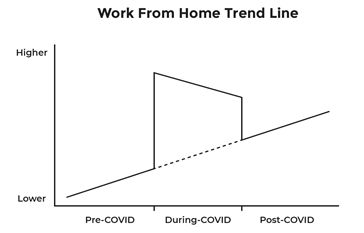Okay, I am giving away my view with the title of this article, but since everyone is talking about it - and I do mean everyone - I will give you my thoughts and predictions.
And it is exactly - to a tee - what I said nine months ago in this article - I wouldn't change a word: The Office, As We Know It, Is Dead? No, It Isn't - Not One Bit!
My strong belief and prediction is that Work-From-Home (WFH) is a trend that started long ago and is moving forward at a moderate pace. COVID made it seem transformational, but it is not. It is just the continuation of a pre-existing trend. I make this point in my upcoming book - The Real Estate Philosopher's Guide - coming out in October - and I have a graph in the book to illustrate my point.

There are many reasons why I conclude that WFH will turn out to be something that sticks around as aforesaid but will not be The Next Big Thing. The biggest reasons are as follows:
First -- most people don't want to really work from home full time in the first place. They would love an extra day - or at most two - a week at home. After that, for most people, it starts to get old. And of course, if your home is a zoo of discomfort, kids running around, and other distractions, that makes going to work almost chillaxing.
Second - people who crave career success know that if the team is at work, they need to be there too, or it will become mission-critical for the company to figure out how to get along without them. And that mission will be achieved sooner or later. The careers of people who don't show up for work will truncate.
Third - employers know full well it is the kiss of death for their culture, teamwork, togetherness, and pretty much everything that makes their company worthwhile to work at in the first place. Sooner or later, every company that can will say something like: You have a job - it is here in the office - come in and do it - or work somewhere else.
Tongue-in-cheek, I make the point that if your workplace stinks - if your boss is a jerk - and it is a pretty awful place to work, then WFH may actually help the company retain its talent longer. I hope that is a rarity.
Fourth - the press will make much more about it than is really there. For example, the eclectic Cool Guy/Cool Gal, whom the company cannot get along without, will do a prima donna dance about how she insists on working from her mountaintop retreat in the Rockies and get away with it, and this will get big news. But the rest of us will all be back at the office.
Fifth - people will complain about their long commutes to cities, and this will get a lot of fanfare, but this is nothing new in the end. We had commutes before COVID that we didn't like, and ultimately it is a choice for people with commutes to live in a location that has the commute in the first place - it isn't something bad that is done to you by your employer. Some people will quit over it. Some will put up with it. Some will beg and plead and get an extra day or so to work from home, but in the end, they will (mostly) come back to work. By the way, I love living in NJ but hate my commute - but I am still going to work.
Sixth - I can't help mentioning that in the article I wrote that I referenced above, I kind of trashed the hub and spokes idea that said companies would open offices in the suburbs. I called it kind of dumb, and sorry if I offended anyone. However, this latest article from Crain's, "Wall Street's return to Manhattan dims suburban office dreams," is saying effectively I was right:
So I am sticking to my guns. WFH is a long-term trend that will grow gradually over time, but it is not transformational for the real estate industry. You will see - just about everyone will be back at work soon - although I acknowledge "soon" may get pushed due to this awful Delta variant.
The content of this article is intended to provide a general guide to the subject matter. Specialist advice should be sought about your specific circumstances.
